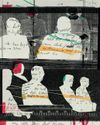
Two small children jump into a bubble bath with expressions of dazed, perpetual pleasure. The taller one has hair like molded chocolate, the other’s is like a yellow ice-cream swirl. Everything—the walls, the children’s skin— looks bouncy, as though it would squeak to the touch. The bubbles are white and opaque, like globs of shaving cream. Music plays, a mixture of giggles and xylophone, with a tune you remember and words you don’t. It keeps repeating. White bubble balls appear all over the hands of the children, on their feet, on their arms. The children, once clean, materialize outside the bathtub and do a happy dance.
This is “Bath Song,” a two-minute-and-fifty-two-second video produced by the children’s-animation juggernaut CoComelon. In the world of babies and toddlers who watch a lot of YouTube, “Bath Song” is “Star Wars,” the moon landing, the white Bronco hurtling across a California freeway. It was uploaded in 2018 and is now the fourth most viewed video on the entire platform. It has been watched nearly seven billion times.
Very young children are crazy for CoComelon—a supercharged, brightly colored, Plasticine utopia. The swirlyhaired baby is called JJ. He has two older siblings, smiling parents who are endlessly available to make rainbow Popsicles, and a diverse group of friends who attend Melon Patch Academy under the tutelage of the youthful Ms. Appleberry. The scenes are depicted from toddler height; shots typically change every one to three seconds. All shapes are rounded at the corners: by company dictum, there are no sharp edges anywhere, so that nothing in CoComelon can hurt.
This story is from the June 17, 2024 edition of The New Yorker.
Start your 7-day Magzter GOLD free trial to access thousands of curated premium stories, and 9,000+ magazines and newspapers.
Already a subscriber ? Sign In
This story is from the June 17, 2024 edition of The New Yorker.
Start your 7-day Magzter GOLD free trial to access thousands of curated premium stories, and 9,000+ magazines and newspapers.
Already a subscriber? Sign In

GET IT TOGETHER
In the beginning was the mob, and the mob was bad. In Gibbon’s 1776 “Decline and Fall of the Roman Empire,” the Roman mob makes regular appearances, usually at the instigation of a demagogue, loudly demanding to be placated with free food and entertainment (“bread and circuses”), and, though they don’t get to rule, they sometimes get to choose who will.

GAINING CONTROL
The frenemies who fought to bring contraception to this country.

REBELS WITH A CAUSE
In the new FX/Hulu series “Say Nothing,” life as an armed revolutionary during the Troubles has—at least at first—an air of glamour.

AGAINST THE CURRENT
\"Give Me Carmelita Tropicana!,\" at Soho Rep, and \"Gatz,\" at the Public.

METAMORPHOSIS
The director Marielle Heller explores the feral side of child rearing.

THE BIG SPIN
A district attorney's office investigates how its prosecutors picked death-penalty juries.

THIS ELECTION JUST PROVES WHAT I ALREADY BELIEVED
I hate to say I told you so, but here we are. Kamala Harris’s loss will go down in history as a catastrophe that could have easily been avoided if more people had thought whatever I happen to think.

HOLD YOUR TONGUE
Can the world's most populous country protect its languages?

A LONG WAY HOME
Ordinarily, I hate staying at someone's house, but when Hugh and I visited his friend Mary in Maine we had no other choice.

YULE RULES
“Christmas Eve in Miller’s Point.”